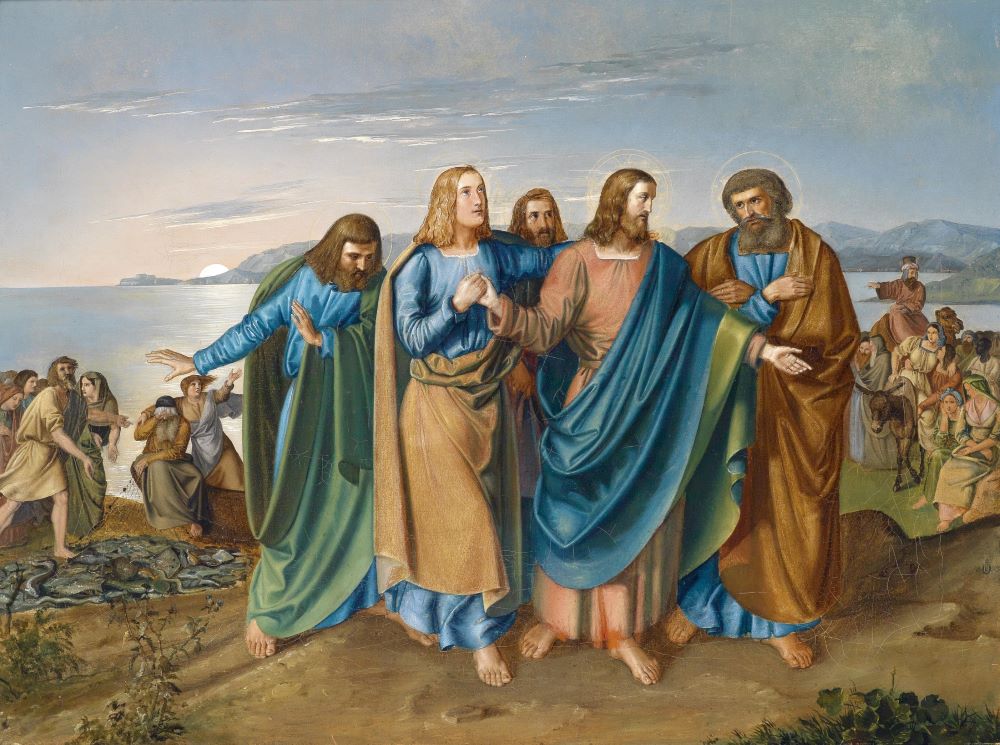
"Jesus at the Sea of Galilee" by Carl Oesterley (German, 1805-1891) (Artvee)
In college, I took a class on the historical Jesus that made me the Christian I am today. As I began to view Jesus within his historical and cultural context, I asked one pivotal question, "What was the message Jesus sent his disciples to spread when he sent them out two by two?"
When I was a member of a Protestant denomination, I clung tightly to what I was told was the main message: Jesus had to die for our sins so that we could go to heaven. Being "saved" and "saving" others was central to my understanding of what it meant to be a Christian. However, all this thinking came after Jesus' death.
I began to listen to the Gospels differently. "You are the light of the world" (Matthew 5:14), Jesus told the people. He also said, " … the one who believes in me will also do the works that I do and, in fact, will do greater works than these … " (John 14:12). Is it possible that Jesus was trying to show us our full potential? "The Kingdom of God is within you … ” (Luke 17:21). Through all his encounters, dinners and actions, was Jesus teaching his disciples a way of being and living that aligned with a God of Love he called Abba?
I was taught that Jesus is God and I am not, so I put Jesus up on a very high pedestal. Yet, I kept hearing Jesus say, "Follow me," "Do these things," and "This is the way." So, what does it mean to be a follower of Jesus? In my prayer and study, the invitation came, "Be like me."
Now, I am no theologian and do not pretend to understand all the ways we try to make sense of the relationships between God, us and the world. What my spiritual life has led me to is a connection with Christ, which I understand to be the spirit of love and oneness Jesus embodied.
Jesus had a connection with the Divine, a knowing and a seeing, that guided his way of being. I have been so captured by the vision and message of Jesus that I, too, want to live in a way that I can see, hear and reveal the Kin-dom of God already within and among us — a Kin-dom of love, belonging, care and justice. Being a practical person, I wondered what that would look like. How can I love God, myself, my neighbor and my enemy better? How do I put on Christ?
What does it mean to be a follower of Jesus? In my prayer and study, the invitation came, "Be like me."
When I ponder how to embody Christ, I often consider the qualities Jesus embodied — love, mercy, compassion, nonviolence, inclusion and care — you could add the fruits of the spirit here (Galatians 5:22-23). Early in my seeking, I was drawn to compassion. How can I genuinely feel and be more compassionate? At that point in my life, I also desired to hone my communication skills. Providence never fails, and I soon came across books on nonviolent communication, or NVC, by Marshall Rosenberg.
As I explored NVC, I realized it was much bigger than communication skills. Over the last eight years that I have practiced NVC, it has allowed me to connect with myself and others with empathy and understanding. First, NVC has helped me become more loving and compassionate with myself. By connecting with and being able to name my feelings, I am able to gain some perspective. Then, I could start to identify what the feelings were trying to tell me. In the language of NVC, our feelings point to universal human needs and values that are or are not being met. Once I am aware of what I need and value, I can find creative ways to tend to the life that wants to live through me.
Moving deeper into the concepts of NVC, I learned ways to move away from speaking and acting with shame, blame, judgment and criticism. It has even helped me love my enemies. NVC teaches me to look and listen beyond someone's behaviors or words to what they might be feeling and needing. Often, I have felt and needed the same things, and this allows me to access empathy and understanding. (Although, it doesn't mean I let others harm me.) Ideally, together, we can find strategies where everyone can have their needs met in nonviolent ways.
Another important concept NVC has taught me is consent. I want everyone to have autonomy and choose what is best for them. Sometimes, that means I need to say "no" to a request. It also means that I am willing to accept and respect someone else when they say "no" to me. This reminds me of the story of the rich young man who Jesus asked to give up his wealth and follow Him. Without shame and judgment, Jesus let him walk away. If anything, I hear Jesus express understanding and sadness about the young man's situation.
Advertisement
NVC has its limitations. It does not acknowledge power dynamics in a relationship. As a tool focused on verbal communication, it may be difficult to use if you are communicating in a second or third language. Finally, when not used in a spirit of genuine compassion and desire to connect, NVC can be used to manipulate others.
With all this in mind, learning NVC has dramatically improved my life. It supports me in seeing beyond good and bad, right and wrong. I am more able to meet myself, others and difficult experiences with kindness and curiosity. When I express gratitude, I can share with others specifically how they impacted me. I live and speak more from my heart and the goodness of my humanity. I am connected to my kind, compassionate, loving and understanding self. I believe NVC has helped me be more like Jesus.
I wonder, what helps you put on Christ? What tools and practices lead you to a greater embodiment of love, peace, and joy?






